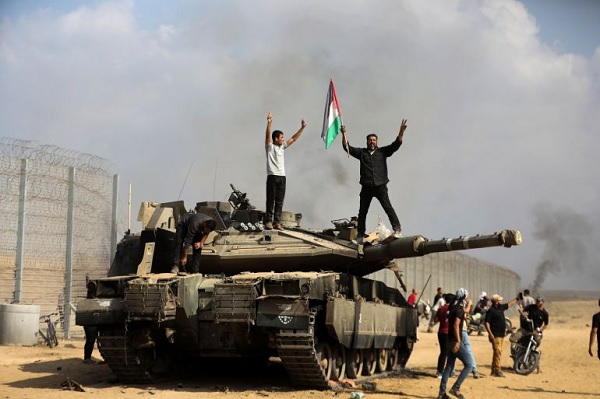By Mary Mensah
Last Saturday, as Israelis were wrapping up the seven-day-long Jewish festival of Sukkot, a full-fledged surprise attack was being waged from the air, sea and ground by Hamas militants, leading to the death of more than 1,200 Israelis mostly.
The armed Hamas militants, many on motorcycles, storm blockaded areas of the Gaza Strip, shooting at Israelis in the Gaza Strip, militants taking Israeli citizens, including mothers, children and the elderly as hostages.
Before Saturday’s operation, the last war between Hamas and Israel was in 2021, which lasted for 11 days and killed at least 250 people in Gaza and 13 in Israel but last Saturday’s assault occurred on the 50th anniversary of the 1973 war, when Israel’s Arab neighbours jointly launched a surprise attack on Yom Kippur, the holiest day in the Jewish calendar, on October 6, 1973, which had occurred during the 10th day of the Islamic holy month of Ramadan in that year.
Outbreak of hostilities
Following the outbreak of hostilities, both the United States and the Soviet Union initiated massive resupply efforts to their allies (Israel and the Arab states respectively) during the war which led to a confrontation between the two nuclear-armed superpowers.
The Yom Kippur War had far-reaching implications; the Arab world had experienced humiliation in the lopsided rout of the Egyptian–Syrian–Jordanian alliance in 1967 but felt psychologically vindicated by early successes in the 1973 conflict.
The Israelis recognised that despite impressive operational and tactical achievements on the battlefield, there was no guarantee that they would always dominate the Arab states militarily, as they had done consistently throughout the First, Second and Third Arab–Israeli Wars; these changes paved the way for the Israeli–Palestinian peace process.
Camp David Accords
At the 1978 Camp David Accords that followed the war, Israel returned the entire Sinai Peninsula to Egypt, which led to the subsequent 1979 Egyptian–Israeli peace treaty, marking the first instance that an Arab country recognised Israel as a legitimate state.
Israel captured Gaza from Egypt in the 1967 war, then withdrew its troops and settlers in 2005. The territory, home to some two million Palestinians, fell under Hamas’ control in 2007 after a brief civil war with Fatah, a rival Palestinian faction that is the backbone of the Palestinian Authority. After Hamas seized control, Israel and Egypt imposed a strict siege on the territory, which is ongoing.
Tensions between Israelis and the Palestinians have existed before Israel’s founding in 1948. Thousands of people on both sides have been killed and many more injured over decades but the violence has been particularly acute this year. The number of Palestinian militants and civilians killed in the occupied West Bank by Israeli forces since the year began is the highest in nearly two decades. The same is true of Israelis and foreigners, most of them civilians killed in Palestinian attacks.
Surprised attack
The news of the surprised attack shocked the whole world as Israel's military and intelligence capability has long been rated as the best in the Middle East and one of the best in the world but reports indicated that the attack lasted for more that 10 hours before Israeli army realised what was happening as they may also have underestimated the abilities of their opponents.
Last Saturday morning, militants from Gaza fired thousands of rockets towards Israeli towns, before breaking through the heavily fortified border fence with Israel and sending militants deep into Israeli territory. There, Hamas gunmen killed hundreds of people, including civilians and soldiers, and took hostages, sometimes from their homes.
Unprecedented
The attacks were unprecedented in tactic and scale as Israel has not faced its adversaries in street battles on its own territory since the 1948 Arab-Israeli war. It has also never faced a terror attack of this magnitude that has taken the lives of more than 1200 people and so many civilians. While Hamas has kidnapped Israelis before, it has never before taken dozens of hostages at once, including children and the elderly.
Hamas called the operation “Al-Aqsa Storm” and said the assault was a response to what it described as Israeli attacks on women, the desecration of the al-Aqsa mosque in Jerusalem and the ongoing siege of Gaza.
After the surprise attack, the number one question on the minds of many was where were the Israel Defence Forces in those long hours as Hamas militants roamed leisurely at will around communities near Gaza and carried out an unprecedented attack by air, sea and land.
"The army completely failed as a quick-reaction force," one Israeli said, pointing to how some of the communities that came under attack had to rely on their own civilian protection forces while they waited for the military to arrive.
The full answer of why this happened will take some time to emerge. But it seems as if surprise, scale and speed overwhelmed defences which were patchy and unprepared for what they faced. Surprise was crucial in Hamas's assault.
Conclusion
Judging from how last Saturdays events unfolded, it is clear that Israeli intelligence failed to get inside the planning by Hamas for the attack. The group seems to have undertaken a long-term programme of deception to give the impression it was incapable or unwilling to launch an ambitious attack. It also practised good operational security, probably keeping off electronic communications.
It took Israeli troops more than two days to take back control as fighting raged in the streets. Since Saturday, it was on Monday that the Israel Defence Forces (IDF) said it had retaken control of all Israeli communities in Gaza’s vicinity on its southern border after fighting with Hamas ended.
By Mary Mensah

